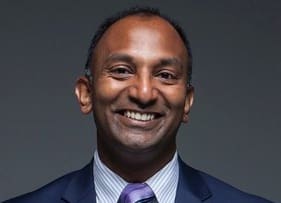
Last week, former Deputy Attorney General and mayoral candidate Thiru Vignarajah joined Stephanie Geller from Community Wealth Builders and the Maryland Neighborhood Exchange, to spotlight local startups and small businesses, as well as a homegrown initiative to access capital from local investors, not just Wall Street venture funds. Their recent efforts were profiled on local TVand in print.
Small businesses in Baltimore, particularly Black-owned businesses, have sometimes struggled to secure capital. Those same businesses have been most ravaged by the pandemic and last to benefit from federal recovery measures. One innovative, first-in-the-nation strategy to address the shortfall in capital is being pioneered right here in Maryland. The strategy allows customers and members of the community to invest directly in local companies in need of capital. The investors have every reason to help their favorite business succeed, and the created value stays in the community.
Vignarajah and Geller spotlighted two companies, one that is completing a successful round of investment fundraising and another whose fundraising opened on October 1. The capital fundraising campaigns are now possible because of changes to the applicable federal regulations.
Vignarajah, who sits on the advisory board of Community Wealth Builders, explained, “Now more than ever, small local businesses need capital, whether to stay afloat or expand. The economic shutdown has amplified these problems but created an opportunity for the community to invest and for the return on those investments to stay in the neighborhood.”
“Nurturing a commercial district is a multifaceted thing,” Geller said. “You can’t do just one thing. You have to do it all.”
Executives from both companies described their promising startup businesses.
Ø Neighborhood Sun, which has already raised significant funds from local stakeholders, invests in community-shared solar power in an effort to combat climate change and bring decisions over clean energy directly to communities. In 2019 alone, the organization completed four major community solar projects including more than 2,000 households.
Ø Black-owned tech startup AfterrHome will be the first in the industry to use artificial intelligence to scan neighborhoods and check for environmental hazards, promoting environmental justice (which they have coined “environmentaljustus”). Their business will offer remote live stream inspections to combat the hazards of Covid-19 and decrease the closing time of real estate transactions.
Vignarajah and Geller were joined by Matty Guerin from Neighborhood Sun and Michael Floyd and Lenora Felder from AfterrHome.
Community Wealth Builders, led by Geller, works to foster more equitable, inclusive, sustainable neighborhood economies by promoting and catalyzing community wealth building strategies. Its newest project, the Maryland Neighborhood Exchange, which was developed in partnership with Michael Shuman, a leading expert on local economics, exemplifies this approach by helping local businesses access capital directly from community stakeholders and their customers.
About the program, Geller said, “By converting customers into investors, businesses can create armies of supporters with a powerful incentive to use and promote their businesses as much as possible. These businesses, in turn, will help their neighborhoods thrive, and by paying returns to resident investors, Baltimoreans—not an outside corporate bank—can build wealth and benefit from local business growth.
As of June 2020, more than a third of U.S. small businesses surveyed said they were at risk of closing permanently if health/safety guidelines limited their operations through the summer, and more than two-thirds said they likely would close if they could not operate fully by late-fall. This need is even greater for minority-owned businesses. According to research released by the Federal Reserve in August 2020, less than a third of Baltimore PPP loans of at least $150,000 went to businesses in majority-Black neighborhoods. Moreover, minority-owned businesses were less likely to secure a loan: of those who applied, over a third did not receive loans. Programs like the Maryland Neighborhood Exchange, led by Community Wealth Builders, are stepping in as third parties to level the playing field.
Since the Exchange’s launch in December 2019, 25 local businesses featured on the Exchange have achieved or surpassed their investment crowdfunding goals, raising over $200,000 for local companies, 85 percent of which are minority-owned businesses.









